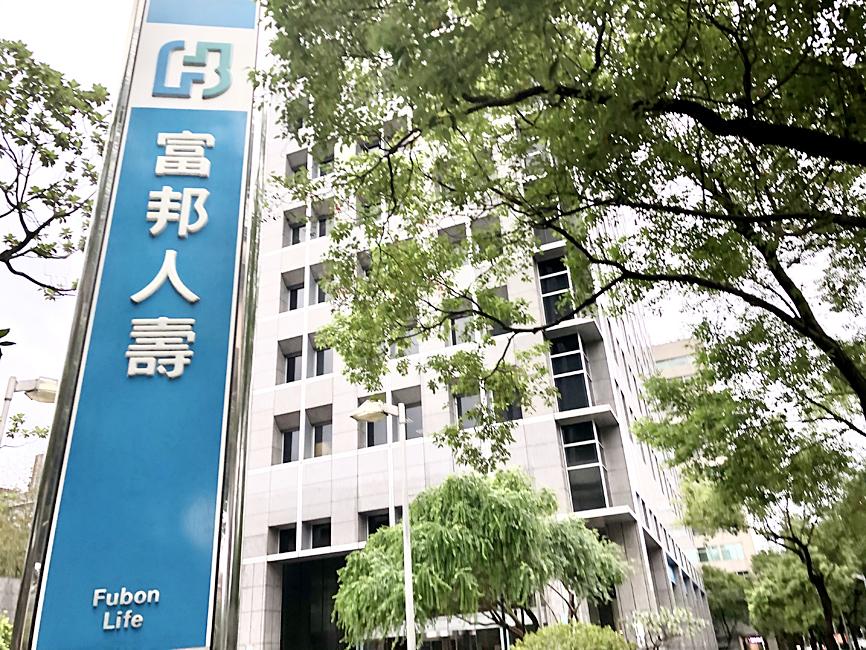Fubon Life Insurance Co (富邦人壽) yesterday reported that its first-year premiums (FYPs) for the first three quarters fell 44.6 percent year-on-year to NT$93.1 billion due to stricter regulations and the COVID-19 pandemic.
The FYPs are received in the first year of a recurring policy and are the main resource for life insures’ new investments.
Fubon Life in May forecast that its FYPs would fall 30 percent for the whole of this year.

Photo: Kelson Wang, Taipei Times
The life insurer yesterday said that the pandemic has slowed down its marketing activities, resulting in the larger-than-expected plunge in FYPs.
As the Financial Supervisory Commission implemented new rules that prevent life insurers from focusing on savings-type policies, Fubon Life was also forced to shift its marketing focus to investment-linked policies, health insurance products and accident-related insurance policies, Fubon Life executive vice president Chao Tsai-Ling (董采苓) told an investors’ conference in Taipei.
“We now predict an annual retreat of 40 percent in our FYPs for the whole of this year, but we expect to regain momentum next year with a high single-digit percentage increase,” Chao said.
Despite the falling FYPs, Fubon Life saw its return on investment before hedging and return on investment after hedging rise to 5.13 percent and 4.51 percent respectively last quarter, up from 4.86 percent and 4.2 percent a quarter earlier.
The trend could be attributed to the company receiving more cash dividends from its stock investments, and more capital gains from its investments in fixed income securities and stocks, Chao said.
Fubon Life’s hedging costs fell to 96 basis points, down from 102 basis points a quarter earlier, Chao said, adding that its hedging costs were lower than those of other life insurers as the firm uses forward contracts to hedge most of its assets, which are a more effective tool than proxy hedges or non-deliverable forwards.
Fubon Life would continue to focus on investing in long-term US dollar-denominated corporate bonds, and would further raise its investment in domestic and foreign stocks, but would make sure that its portfolio is diversified, she said,
Meanwhile, Taipei Fubon Commercial Bank (台北富邦銀行), the banking arm of Fubon Financial Holding Co (富邦金控), reported a d of 3 percent in its net fee income for the first three quarters due to declining wealth management business and slowing syndicated loans, general manager Roman Cheng (程耀輝) said.
The bank would concentrate on providing personal loans, and loans to small and medium-sized companies as they have higher margins, Cheng said.
The combined profits at its overseas branches fell 24 percent to NT$3.31 billion for the first three quarters as its Hong Kong branch was affected by interest rate cuts and the territory’s political tensions, while its branch in Singapore set more loan provisions due to bad loans, Cheng said.
Fubon Financial is forecasting that the local economy would rally 3.5 percent to 4 percent next year, depending on COVID-19 vaccine development, chief economist Lo Wei (羅瑋) said.

Stephen Garrett, a 27-year-old graduate student, always thought he would study in China, but first the country’s restrictive COVID-19 policies made it nearly impossible and now he has other concerns. The cost is one deterrent, but Garrett is more worried about restrictions on academic freedom and the personal risk of being stranded in China. He is not alone. Only about 700 American students are studying at Chinese universities, down from a peak of nearly 25,000 a decade ago, while there are nearly 300,000 Chinese students at US schools. Some young Americans are discouraged from investing their time in China by what they see

MAJOR DROP: CEO Tim Cook, who is visiting Hanoi, pledged the firm was committed to Vietnam after its smartphone shipments declined 9.6% annually in the first quarter Apple Inc yesterday said it would increase spending on suppliers in Vietnam, a key production hub, as CEO Tim Cook arrived in the country for a two-day visit. The iPhone maker announced the news in a statement on its Web site, but gave no details of how much it would spend or where the money would go. Cook is expected to meet programmers, content creators and students during his visit, online newspaper VnExpress reported. The visit comes as US President Joe Biden’s administration seeks to ramp up Vietnam’s role in the global tech supply chain to reduce the US’ dependence on China. Images on

Taiwan Transport and Storage Corp (TTS, 台灣通運倉儲) yesterday unveiled its first electric tractor unit — manufactured by Volvo Trucks — in a ceremony in Taipei, and said the unit would soon be used to transport cement produced by Taiwan Cement Corp (TCC, 台灣水泥). Both TTS and TCC belong to TCC International Holdings Ltd (台泥國際集團). With the electric tractor unit, the Taipei-based cement firm would become the first in Taiwan to use electric vehicles to transport construction materials. TTS chairman Koo Kung-yi (辜公怡), Volvo Trucks vice president of sales and marketing Johan Selven, TCC president Roman Cheng (程耀輝) and Taikoo Motors Group

New apartments in Taiwan’s major cities are getting smaller, while old apartments are increasingly occupied by older people, many of whom live alone, government data showed. The phenomenon has to do with sharpening unaffordable property prices and an aging population, property brokers said. Apartments with one bedroom that are two years old or older have gained a noticeable presence in the nation’s six special municipalities as well as Hsinchu county and city in the past five years, Evertrust Rehouse Co (永慶房產集團) found, citing data from the government’s real-price transaction platform. In Taipei, apartments with one bedroom accounted for 19 percent of deals last